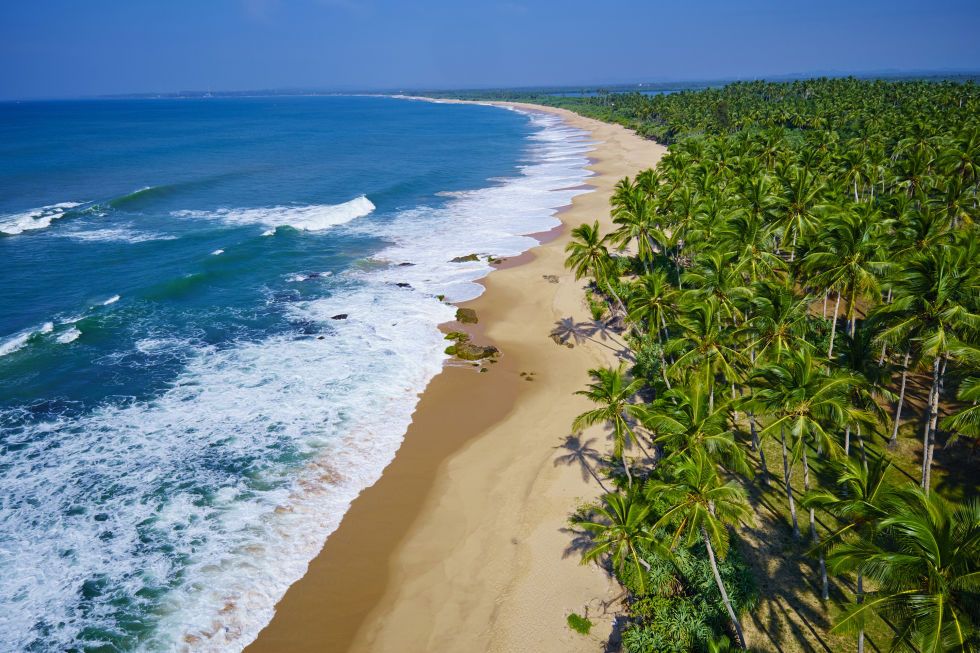Sri Lanka is an island nation in South Asia, located in the Indian Ocean just south of the Indian subcontinent. Its area is 65610 km2 with a coastline stretching 1340 km. The population stands at 21700000. The administrative capital is Sri Jayawardenepura Kotte, while Colombo remains the commercial hub. Official languages are Sinhala and Tamil, and English is recognized as a national language widely used in business and tourism. Alcohol may be sold by licensed vendors to persons aged 18 and over. All narcotics are strictly prohibited. Legal gambling is limited to licensed casinos in major hotels.
History
Human presence in Sri Lanka dates back to the Neolithic era around 2500 BCE. In the early first millennium BCE, Dravidian migrants from southern India settled and laid the cultural foundations of the Tamil population. By the fourth century BCE, Sinhalese chiefdoms emerged in the north and northwest. In 303 BCE, King Devanampiya Tissa accepted Buddhism from the Indian missionary Mahinda, making Anuradhapura one of the world’s oldest continuously Buddhist capitals. The city flourished for over a millennium until invasions and internal strife led to its decline in the ninth century, shifting the power center to Polonnaruwa in the eleventh century. There, kings built monumental stupas such as Ruwanwelisaya and Jetavanaramaya.
By the thirteenth century Polonnaruwa also waned, and capitals moved southward through Dambadeniya and Gampola before settling in the hill kingdom of Kandy. In 1505 Portuguese traders and missionaries landed on the southern coast, establishing control over the spice trade. They were ousted by the Dutch in 1640, who managed the colony through the Dutch East India Company. In 1796 the British expelled the Dutch and by 1815 annexed Kandy, making Ceylon a crown colony.
Anti-colonial riots in 1915, driven by Buddhist nationalist resistance to British repression, foreshadowed the independence movement. On 4 February 1948 Ceylon became an independent dominion within the British Commonwealth. Constitutional reforms in 1972 transformed it into the Republic of Sri Lanka. Long-standing tensions between the Sinhalese majority and Tamil minority erupted into civil war in 1983, led by the Liberation Tigers of Tamil Eelam, who sought an independent Tamil state. The conflict claimed over 100000 lives and displaced hundreds of thousands before ending in 2009 with the military defeat of the Tigers.
On 26 December 2004 the Indian Ocean tsunami, triggered by a massive undersea earthquake off Sumatra, claimed up to 35000 lives in Sri Lanka and devastated coastal communities. International aid rebuilt infrastructure, ports and roads, and by the 2010s the economy was growing, driven by tea, apparel and tourism. A severe financial crisis in 2022 caused shortages of fuel and food, but by 2023 stabilization efforts and new foreign investment began restoring normalcy.
Industry
Sri Lanka is renowned as a leading exporter of Ceylon tea. Other major sectors include rubber plantations, coconut products (oil and copra), ready-made garments for export, and gemstones such as sapphires and rubies. Food processing, tobacco, and light engineering also contribute. In recent years information technology outsourcing, business process services, and ship repair in the ports of Colombo and Galle have expanded rapidly.
Religion and Ethnicity
About 70 percent of the population practices Theravada Buddhism, 12.6 percent Hinduism, 9.7 percent Islam and 7.4 percent Christianity. Ethnic groups are Sinhalese (74.9 percent), Sri Lankan and Indian Tamils (15 percent), Moors (9.3 percent) and others (0.8 percent). Religious traditions include daily offerings at Buddhist dagobas, Hindu kovil processions in Matale, Ramadan fasting and Eid prayers for Muslims, and Christmas and Easter processions among Christians.
Wars and Conflicts
The longest conflict was the civil war from 1983 to 2009 between government forces and the Tamil Tigers, marked by human rights abuses on both sides and a significant humanitarian toll. Earlier Marxist insurgencies in 1971 and 1987–1989 were localized but were harshly suppressed by the government. Sporadic militant activity persisted in the north until about 2015.
Standard of Living
Sri Lanka’s Human Development Index is 0.780, placing it in the medium category. Nominal per-capita income is about USD 4500. Transparency International ranks its corruption level around 90th out of 180 countries. Income disparity between urban and rural areas remains pronounced and youth unemployment is comparatively high.
Healthcare
A government-run public health system provides free care to citizens, but tourists must use private clinics and hospitals, which charge international rates. Visitors are advised to carry travel insurance. Vaccinations against hepatitis A and typhoid are recommended. Only bottled water should be consumed. Major cities have modern hospitals comparable to mid-range international standards.
Holidays
Sinhala and Tamil New Year is celebrated on 13–14 April with home cleansing rituals, family gatherings and traditional games. Independence Day on 4 February features official ceremonies and parades. Vesak in May marks Buddha’s birth, enlightenment and passing with lantern festivals and temple decorations. Diwali in October–November is the Hindu festival of lights. The Kandy Esala Perahera in July–August is a grand procession of decorated elephants, drummers and dancers.
Traditions
Visitors must remove footwear before entering homes and temples. A polite greeting involves bowing with palms together. Touching another person’s head is disrespectful, as is showing the soles of your feet. Tourists should dress modestly in religious sites and seek permission before photographing sacred objects.
Interesting Facts
Sri Lanka is the birthplace of Ceylon tea, first cultivated in the nineteenth century. Scenes from “Indiana Jones and the Temple of Doom” and “Pulp Fiction” were filmed here. Science-fiction writer Arthur C. Clarke lived in Sri Lanka for decades. In 2019 Yala National Park recorded one of the highest leopard densities in the world. The 2004 tsunami spurred global improvements in early-warning systems.
Money
The currency is the Sri Lankan rupee (LKR). Credit cards are accepted in hotels, major restaurants and malls. ATMs are widespread in urban areas. The exchange rate hovers around LKR 320 per USD. Currency exchange is most favorable at banks and official exchange bureaus; local markets prefer cash. Tipping of 5–10 percent or rounding up the bill is customary.
Household Details
Electricity is 230 V at 50 Hz. Plugs are types D (Indian) and G (British). Mobile coverage by Dialog, Mobitel and Airtel spans almost the entire island, with 4G available in cities and 3G/EDGE in remote areas.
Clothing
Lightweight cotton garments are ideal year-round. In temples and mosques, shoulders and knees must be covered. Beachwear is acceptable on the shore but not in most public or religious spaces. Open-toe sandals are common, and hats or caps with sunglasses are recommended under the tropical sun.
Tourism
Sri Lanka offers world-class beaches, ancient cultural sites, hill-country tea plantations, jungle treks, wildlife safaris and whale-watching cruises. The tourism infrastructure includes five-star resorts, boutique villas, guesthouses and eco-lodges. The international airport in Colombo, an extensive rail network, intercity buses and private tour operators ensure convenient travel for visitors.
Types of Tourism
Beach tourism along the south and east coasts
Cultural and historical tours of Anuradhapura, Polonnaruwa and Sigiriya
Hill-country trekking to Adam’s Peak and Ella
Cycling routes through rural landscapes
White-water rafting on central rivers
Wildlife safaris in national parks
Whale and dolphin watching off the southern shores
Culinary and tea-plantation experiences
List of Tourist Attractions
Anuradhapura – ancient Buddhist capital since the fourth century BCE (UNESCO)
Polonnaruwa – medieval Sinhalese capital of the eleventh–twelfth centuries CE (UNESCO)
Sigiriya – fifth-century rock fortress with frescoes (UNESCO)
Temple of the Tooth in Kandy – sacred Buddhist temple (UNESCO)
Dambulla Cave Temple – rock-hewn Buddhist shrine complex (UNESCO)
Galle Fort – seventeenth-century Dutch fortification (UNESCO)
Central Highlands – biodiversity hotspot and tea-growing region (UNESCO)
List of Non-Tourist Attractions
Ritigala Ruins – overgrown Buddhist monastery in dense forest
North-eastern fishing villages – traditional coastal livelihoods
Ella Viewpoint – panoramic vistas of valleys and terraced plantations
Kumana Bird Sanctuary – key stopover for migratory birds
Abandoned Gallukmale Mines – nineteenth-century industrial relics
Local Cuisine
Rice and curry featuring fish, chicken or vegetables
Hoppers – lacy rice flour pancakes served plain, with egg or coconut milk
Kottu – chopped roti stir-fried with meat, eggs and vegetables
Pol Sambol – spicy coconut relish
Arrack – distilled spirit from coconut toddy
Meals are typically breakfast from 7 to 9 AM, lunch 12 to 2 PM, dinner after 6 PM. Street-food safety is high in busy stalls, and restaurant tipping of 5–10 percent is appreciated.
Why Visit
Sri Lanka blends millennia-old temples and colonial forts with pristine beaches, misty mountains and abundant wildlife. Prices are lower than in many Asian destinations, and the warmth of the people ensures an unforgettable stay.
Safety for Tourists
Petty crime is rare. Terrorist threats have diminished since the end of the civil war. Wildlife encounters are confined to protected areas and require guides. CCTV coverage is growing in cities. Monsoon rains can cause flooding. Public hygiene meets international norms but only bottled water should be consumed.
Service Level
Five-star hotels offer spa services, pools and guided tours. Guesthouses provide homely charm but service may be slower. English proficiency among staff is generally good and hospitality is genuine.
Entry Rules
Most nationalities require an Electronic Travel Authorization (ETA) applied for online in advance. Passports must be valid for at least six months beyond entry. Fresh fruits, vegetables and meat products are prohibited. Currency above USD 10000 equivalent must be declared.
Transport
Intercity buses and express trains link major towns. Train tickets should be booked in advance online or at stations. Tuk-tuks in cities charge negotiated fares before departure. Private minibuses and tourist coaches are available for day tours.
Car
International drivers’ licenses are accepted for car rental. Traffic drives on the left. Local drivers may disregard signs and lane markings. There are few toll roads. Police bribery can occur. Speed limits are 50 km/h in cities, 80 km/h on highways. Speed-camera enforcement is minimal. SUVs or four-wheel-drive vehicles are recommended for rural routes. Fines are modest but must be paid promptly.
Noise Regulation
Residential areas enforce quiet hours from 22:00 to 06:00. Temples and wildlife reserves require silence at all times.
Daily Budget
Budget travel costs about LKR 8000–12000 (USD 25–38) per day. A comfortable budget runs LKR 18000–25000 (USD 57–80).
What Not to Do
Do not touch sacred relics or Buddha statues. Do not photograph military installations. Avoid discussing sensitive religious or ethnic issues. Possession of drugs leads to severe penalties.
Climate
Tropical monsoon climate with two distinct wet seasons. The southwest coast and hills are driest from December to March; the east coast from May to September. Average coastal temperatures range 27–30 °C; hill country averages around 20 °C.
Travel Tips
Get vaccines for hepatitis A and typhoid. Use insect repellent and mosquito nets. Drink only bottled water. Purchase travel insurance in advance. Download offline maps before visiting remote areas. Enjoy your journey!
- Dance of Spirits in the Arctic Sky: The Northern Lights in Lofoten Island Mythology
- From trauma healers to in-house psychologists, hotels are increasingly catering to travellers’ mental health
- Saami
- Global traveler risk ranking 2025
- Indonesia
- Evacuation of Kyiv icons takes fight for Ukraine’s heritage to Louvre in Paris
- Dagestan
- Kyrgyzstan
- Sanin Coast Road Trip
- The September 11 Terrorist Attack: How the Tragedy Changed Tourism
- Aztecs
- Weekend in Moab: Arches, Canyons, and the Spirit of Adventure
- Chukchi
- Germany
- Macau
- Hiroshima’s nuclear blast: how tragedy reshaped travel routes
- Unadsdalur Church
- Greece
- Holiday in Monaco
- Chechnya












